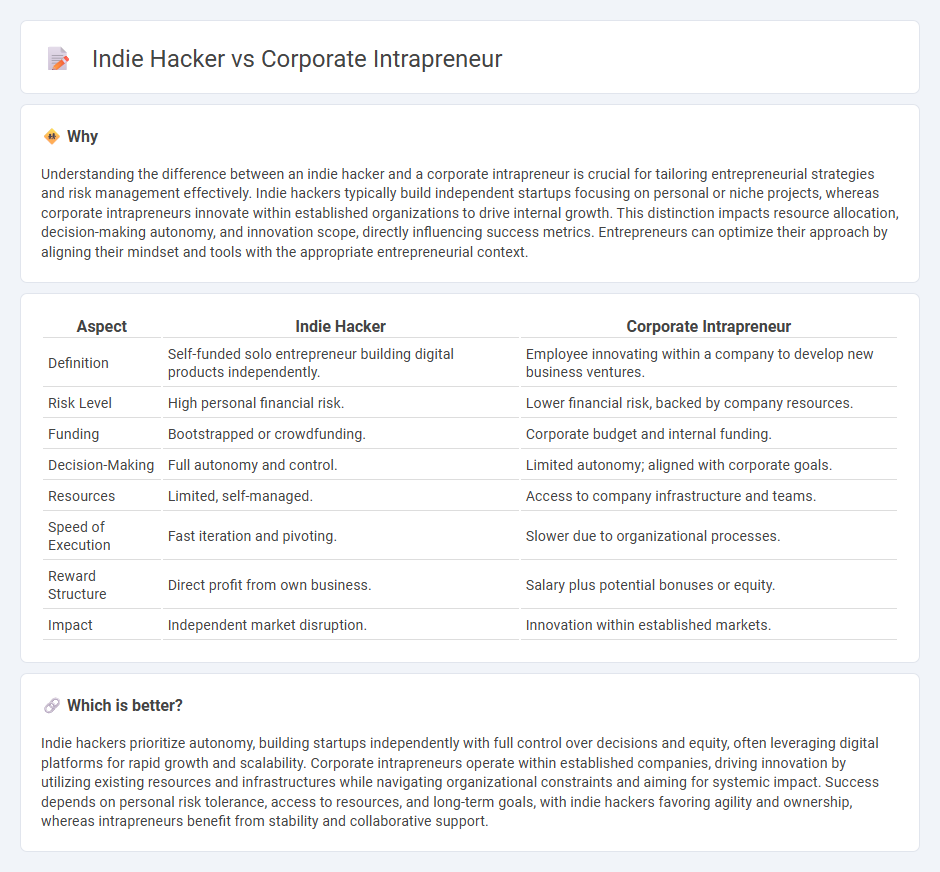
Indie hackers drive innovation by independently building and launching startups, embracing autonomy and direct control over their ventures, while corporate intrapreneurs innovate within established companies, leveraging organizational resources to develop new products or processes. Both pathways require entrepreneurial skills, but indie hackers face high personal risk compared to intrapreneurs who benefit from corporate support and infrastructure. Discover more about the unique challenges and opportunities in both entrepreneurial roles.
Why it is important
Understanding the difference between an indie hacker and a corporate intrapreneur is crucial for tailoring entrepreneurial strategies and risk management effectively. Indie hackers typically build independent startups focusing on personal or niche projects, whereas corporate intrapreneurs innovate within established organizations to drive internal growth. This distinction impacts resource allocation, decision-making autonomy, and innovation scope, directly influencing success metrics. Entrepreneurs can optimize their approach by aligning their mindset and tools with the appropriate entrepreneurial context.
Comparison Table
| Aspect | Indie Hacker | Corporate Intrapreneur |
|---|---|---|
| Definition | Self-funded solo entrepreneur building digital products independently. | Employee innovating within a company to develop new business ventures. |
| Risk Level | High personal financial risk. | Lower financial risk, backed by company resources. |
| Funding | Bootstrapped or crowdfunding. | Corporate budget and internal funding. |
| Decision-Making | Full autonomy and control. | Limited autonomy; aligned with corporate goals. |
| Resources | Limited, self-managed. | Access to company infrastructure and teams. |
| Speed of Execution | Fast iteration and pivoting. | Slower due to organizational processes. |
| Reward Structure | Direct profit from own business. | Salary plus potential bonuses or equity. |
| Impact | Independent market disruption. | Innovation within established markets. |
Which is better?
Indie hackers prioritize autonomy, building startups independently with full control over decisions and equity, often leveraging digital platforms for rapid growth and scalability. Corporate intrapreneurs operate within established companies, driving innovation by utilizing existing resources and infrastructures while navigating organizational constraints and aiming for systemic impact. Success depends on personal risk tolerance, access to resources, and long-term goals, with indie hackers favoring agility and ownership, whereas intrapreneurs benefit from stability and collaborative support.
Connection
Indie hackers and corporate intrapreneurs both drive innovation by leveraging entrepreneurial skills within different environments--indie hackers operate independently, building startups or side projects, while intrapreneurs innovate inside established companies. Both focus on agile product development, rapid experimentation, and customer-centric solutions to validate ideas and create value. The shared mindset of risk-taking and resourcefulness bridges independent ventures and corporate initiatives, enabling cross-pollination of entrepreneurial best practices.
Key Terms
Ownership
Corporate intrapreneurs navigate innovation within established companies, leveraging internal resources while often facing structured hierarchies that limit full ownership. Indie hackers, by contrast, maintain complete ownership and control over their projects, embracing independent risk and reward in building startups from the ground up. Explore deeper insights into how ownership impacts innovation, control, and growth pathways in both models.
Resources
Corporate intrapreneurs benefit from access to substantial company resources, including funding, skilled teams, and established infrastructure, enabling faster scaling and risk mitigation. Indie hackers rely primarily on personal savings, small-scale tools, and grassroots networks, emphasizing creativity and lean operations to maintain independence. Discover more about leveraging resources effectively in both paths to entrepreneurial success.
Autonomy
Corporate intrapreneurs benefit from structured resources and organizational support while pursuing innovation within established companies, enabling them to leverage existing networks and funding. Indie hackers prioritize complete autonomy, independently developing and launching projects without traditional corporate constraints, often relying on personal skills and limited budgets. Explore further to understand how autonomy shapes their approaches and impacts success.
Source and External Links
What is intrapreneurship, and how can you cultivate it at your company? - An intrapreneur is an internal entrepreneur within an established company who drives innovation and improvement without bearing financial risks, fostering growth by leveraging creative and entrepreneurial skills inside the organization.
How Big Companies Can Make The Intrapreneur Sexy Again - Intrapreneurs use existing company resources and continuously engage with customers to experiment with new business models and value propositions that benefit the parent company from within.
Empowering the Intrapreneurs in Your Business - Intrapreneurs think and act like entrepreneurs inside a company, turning innovative ideas into cost-saving or revenue-generating initiatives by improving processes and identifying new market opportunities.
 dowidth.com
dowidth.com